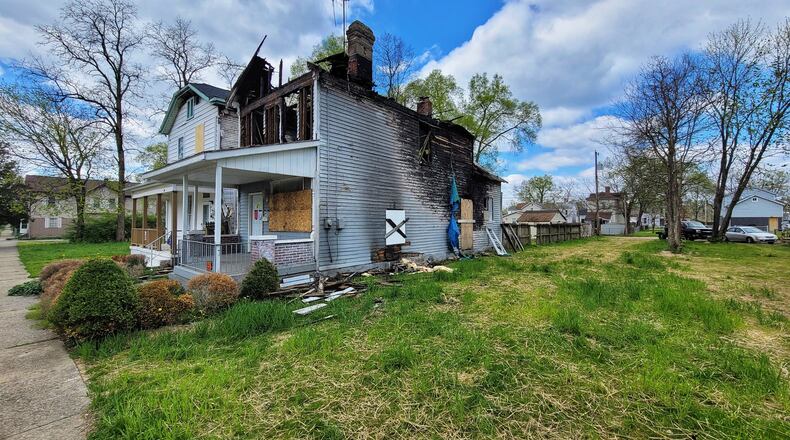For a house that has been abandoned five years or more, the annual registration fee would be $3,200, with the fee starting at $200 the first year and doubling through year five.
Of the residential fires that happened in Hamilton during 2019, 21 percent were in vacant properties, Fire Chief Mark Mercer told the council. And, “In 2020, 23 percent of those were in vacant properties.”
Mercer detailed a series of fires since the 900 block of Greenwood Avenue that also ruined nearby buildings. Wood-frame houses in the area are more susceptible to fires, he said.
In January of 2019, a fire happened at 940 Greenwood, a house that was occupied. The next month, fire struck an empty house at 914 Greenwood. Seventeen days later, that property, which had been empty a long time again was on fire. In July 2020, a vacant house at 920 Greenwood was on fire. That house was demolished afterward.
Because of the 920 Greenwood fire, the next-door house at 918 Greenwood, which was occupied by a family, was damaged and became vacant after that. The next-door building on the other side, 922 Greenwood, also was damaged by the fire and was demolished. The building at 918 Greenwood was later purchased as an investment property “and sat vacant, causing blight in this neighborhood, to this current day. It’s still standing there,” Mercer said.
That building was declared a nuisance, and the city’s Nuisance Appeals Board ruled it needed to be demolished, “and three weeks after that ruling ... it caught fire again.” That blaze damaged the house next to it at 916 Greenwood, which was occupied by a woman and three children who were renting: “The building was damaged, the people lost all their property,” Mercer said.
Mercer said there were “eight fires in two years, in one block,” he said. “This is a neighborhood that has just been decimated by the blight.”
Hamilton real-estate agent Phil Morrical asked whether any arrests were made in those fires, “because having property in that area, I heard — and I think I made a call, even — that there was one person who was a suspect who was setting all these fires. If an arrest had been made, perhaps it would have been solved.”
Eric Vincent, president of the Butler County Real Estate Investors Association, earlier this week complained the legislation took him and others by surprise. He told the Journal-News and council he believes the ordinance will harm grieving families who have difficulty dealing with the emotional task of emptying the homes of deceased parents. Also, he was concerned about situations when someone is in the hospital and their home is empty.
Mercer said such situations are not what officials are trying to remedy. If a property is kept up while it is empty, if the utilities are on and it is not a nuisance to the neighborhood, he would waive the annual fees. Mercer said he would be “exceptionally liberal on that.”
Some citizens asked the city to postpone the vote, because, “I think the city has rushed to judgment on this,” Morrical said.
“I think this is another tool that we can use to get control of the blight, to reduce the blight,” Council Member Michael Ryan said before the vote. “This is something that we can use that will keep our first-responders safe, and that will keep our neighborhoods safe, and that will hopefully reduce the deterioration that we’re having in our historical neighborhoods, and to hold those accountable who are being negligent.”
Council Member Carla Fiehrer said, “The people we’re forgetting about are who are living next door to these properties. They’re the ones that we’re supposed to be speaking for.”
“I believe that we will monitor it,” Fiehrer added. “If we have to change it, we will. But I think this is a good thing to do.”
Ryan followed up: “As Carla said, it is not fair for the old ladies that live in Lindenwald that are 80 years old, who live in the same home for 50 years and they’ve got to wake up and stare at a home that is causing problems for the neighborhood.”
“Let’s just see how this works in action,” Mayor Pat Moeller told Vincent when he spoke against the legislation during the meeting.
About the Author




